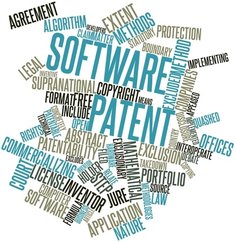
Does the First Amendment require that software patents be abolished? That was the question raised by Federal Circuit Judge Haladane Mayer in a recent concurring opinion issued in Intellectual Ventures v. Symantec.
First, some background. In the 2014 Supreme Court case Alice Corporation v. CLS Bank International, the Supreme Court ruled, 9-0, that abstract ideas simply cannot be patented under Section 101 of the Patent Act. Under that doctrine, the Court invalidated the patents in suit that claimed (1) a method for exchanging financial obligations, (2) a computer system configured to carry out the method for exchanging obligations, and (3) a computer-readable medium containing program code for performing the method of exchanging obligations.
The effect of Alice is that many (if not all) software patents may not be patentable. And, indeed, this was the result in the Intellectual Ventures case, where the Federal Circuit invalidated three patents under Section 101 that were directed to email communication and virus scanning. But, in addition to the Federal Circuit's standard Alice analysis, Judge Mayer argued in concurrence that the First Amendment prevented such ideas from being patentable:
The Constitution protects the right to receive information and ideas. . . . This right to receive information and ideas, regardless of their social worth, is fundamental to our free society.. Patents, which function as government-sanctioned monopolies, invade core First Amendment rights when they are allowed to obstruct the essential channels of scientific, economic, and political discourse.
Section 101, if properly applied, can preserve the Internet’s open architecture and weed out those patents that chill political expression and impermissibly obstruct the marketplace of ideas.
The idea that software patents chill free speech and are therefore impermissible under the First Amendment is a novel one. Taken to its logical conclusion, any patent involving communication protocols--whether in software or hardware--could be subject to invalidation under the First Amendment. It remains to be seen whether other judges pick up Judge Mayer's idea and develop it further.
Image Copyright
First, some background. In the 2014 Supreme Court case Alice Corporation v. CLS Bank International, the Supreme Court ruled, 9-0, that abstract ideas simply cannot be patented under Section 101 of the Patent Act. Under that doctrine, the Court invalidated the patents in suit that claimed (1) a method for exchanging financial obligations, (2) a computer system configured to carry out the method for exchanging obligations, and (3) a computer-readable medium containing program code for performing the method of exchanging obligations.
The effect of Alice is that many (if not all) software patents may not be patentable. And, indeed, this was the result in the Intellectual Ventures case, where the Federal Circuit invalidated three patents under Section 101 that were directed to email communication and virus scanning. But, in addition to the Federal Circuit's standard Alice analysis, Judge Mayer argued in concurrence that the First Amendment prevented such ideas from being patentable:
The Constitution protects the right to receive information and ideas. . . . This right to receive information and ideas, regardless of their social worth, is fundamental to our free society.. Patents, which function as government-sanctioned monopolies, invade core First Amendment rights when they are allowed to obstruct the essential channels of scientific, economic, and political discourse.
Section 101, if properly applied, can preserve the Internet’s open architecture and weed out those patents that chill political expression and impermissibly obstruct the marketplace of ideas.
The idea that software patents chill free speech and are therefore impermissible under the First Amendment is a novel one. Taken to its logical conclusion, any patent involving communication protocols--whether in software or hardware--could be subject to invalidation under the First Amendment. It remains to be seen whether other judges pick up Judge Mayer's idea and develop it further.
Image Copyright
